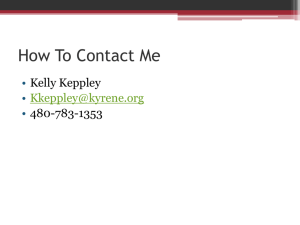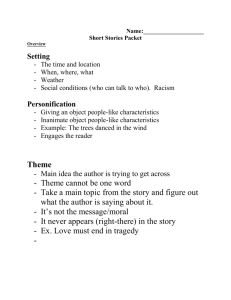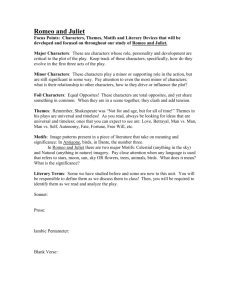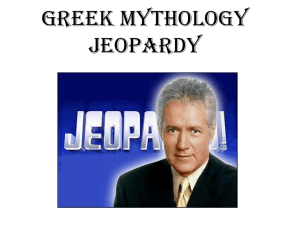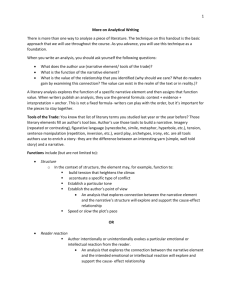Literary Devices
advertisement
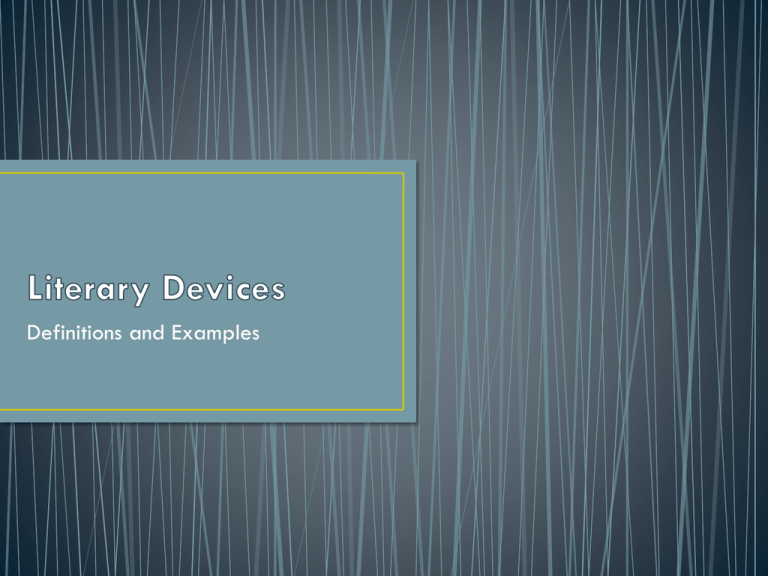
Definitions and Examples • Extended metaphor where the object & actions in a narrative, are equated with the meaning that lie outside the narrative itself • e.g. Blindfolded female statue with scales for Justice http://www.wellpromo.com/PrintableImprinted-Branded-Printing-Printed/j/Justice/ • Reference to a person, place, thing, event, or idea in history, classical literature, or even pop culture (mostly biblical) • e.g. Clockwork Orange http://moviescreens.tripod.com/clockw ork/ http://templepoetry.blogspot.com/20 09/10/intertextuality-allusion.html • Intentional or Unintentional use of a person, object or event that is out of place chronologically • e.g. The Knight’s Tale (2001) in a scene of jousting tournament the crowd sings “We Will Rock You” by Queen and also does the wave • Force that opposes the protagonist • e.g. Voldemort vs. Harry Potter or Edward vs. Jacob http://elirutten.deviantart.com/art/Harry-Potter-vs-Voldemort211975713 http://www.google.com/imgres?q=jacob+vs+edward&um=1&hl =en&client=firefox-a&sa=N&rls=org.mozilla:enUS:official&biw=1366&bih=575&tbm=isch&tbnid=uVggeZ1YaB • Is the process by which the writer reveals the personality of a character. • Direct Characterization tells the audience what the personality of the character is. • e.g. “The patient boy and quiet girl were both well mannered and did not disobey their mother.” • Indirect Characterization shows things that reveal the personality of a character. • S-Speech • T-Thoughts • E-Effect on others toward the character • A-Actions • L-Looks • e.g “The boy took his time with work. The girl responds with phrases like “Yes ma’am” and “No sir.” http://www.readwritethink.org/files/resou rces/lesson_images/lesson800/Characteri zation.pdf • The point of greatest tension or emotional intensity in a plot, the turning point • Carrie (1976) pigs blood before killing classmates http://theeverythingstore.wordpress. com/2009/02/08/725/ • A confrontation or struggle between opposing characters or forces in a plot whether it be internal or external. • e.g. Man vs. Self Man vs. Man Man vs. Nature Man vs. Society Man vs. Technology http://systematicdeviation.blogspot.co m/ • “Unknotting” of the plot falling action, resolution, or conclusion/solution to mystery • e.g Cinderella’s wedding • The language of a particular district, class, or group of persons-encompasses the sounds, spelling, grammar, and diction employed by a specific people as distinguished from other persons either geographically or socially. • e.g Mark Twain uses exaggerated dialect in his Huckleberry Finn to differentiate between characters: http://bernel.blogspot.com/2010_08_0 1_archive.html http://web.cn.edu/kwheeler/lit_terms_d .html • Jim: "We's safe, Huck, we's safe! Jump up and crack yo' heels. Dat's de good ole Cairo at las', I jis knows it." • Huck: "I'll take the canoe and go see, Jim. It mightn't be, you know." Connotation • Associations & Implications that go beyond a word’s definitions (positive or negative) • Hollywood is the place of romance and glittering success. http://www.gointothestory. com/2011/06/hollywoodtales_21.html Denotation • Literal dictionary definition of word • Hollywood is a city in California. • Interruption of the chronological sequence of events by interjection of scenes or events of earlier occurrence • e.g. Toy Story (1999) Jessie’s backstory • Hints & Clues to suggest what will happen later in a plot • e.g. Romeo & Juliet by Shakespeare “Prologue” http://morgankoehn.blogspot. com/ • “A pair of star-cross'd lovers take their life; Whose misadventured piteous overthrows Do with their death bury their parents' strife” (Act I, Prologue). • Distinctive type of category of literary composition, such as epic, novel, poem, short story, etc. • e.g. Fairy-Tales http://ah_coo.tripod.com/goldil ocks.htm • Pictures or images in the reader’s mind; description based on any of the five senses • e.g. Smell-sweaty clothes, the pungent skin, dusty odor of the dry earth http://www.dlackey.org/weblog/2010/03/ • Logical conclusion drawn from available data • e.g. Student X has only two grades a 65 and a 59. One can infer the student is not passing. http://www.allfacebook.com/facebook -college-grades-2009-04 • Dramatic-the audience knows more than the characters e.g. pranks or scary movies • Verbal-Sarcasm e.g. “Sure you can live forever” • Situational- An occasion in which the outcome is significantly different from what was expected or considered appropriate e.g. Juliet takes a drug to fake her death, Romeo however takes poison as he believes Juliet to be dead, when she awakens from her self-induced coma, she finds Romeo's body and thus kills herself for real. • Comparison of an unknown object between a known object without using “like” or “as” to understand the unknown object • e.g. “His head was spinning with ideas.” • Emotions intended to be felt by the reader of a literary work • “He furtively glanced behind him, for hear of his imagined pursuers, then hurriedly walked on, jumping at the slightest sound even of a leaf crackling under his own foot.” http://www.inetteacher.com/Upload1/102670 /docs/Tone-Mood%20Worksheet.pdf • The mixture of situation and personality that impels a character to behave the way he or she does. • e.g. Wolf in Red Riding hood http://www.onlineaudiostories.com/tag/good-vsevil/ • A speaker through whom an author presents a narrative, often but not always a character in the work. • e.g. Wilson, the volleyball addressed by Chuck Noland, the marooned character played by Tom Hanks in the film Cast Away (2000), is a narrative device used to inform the audience of the thoughts and feelings of the isolated, lonely protagonist. http://www2.ljworld.com/photos /2001/jan/08/16298/ • Attributing of human characteristics to nonhuman things • e.g. cartoons http://disney.wikia.com/wiki/The_Little_Mermaid http://www.fanpop.com/spots/beauty-and-thebeast/images/309492/title/beauty-beast-photo • Structure of the story • The arrangement and interrelation of events in a narrative work Conflict Climax Falling Action Rising Action Exposition Denouement • 1st Person- “I” e.g “I just finished a 60 hour work week. Exhausted out of my mind I begged for sleep. Just as I, was drifting, I heard the startling sound of a saxophone.” • 2nd person- “you” e.g. “You come home after a long night’s work. Your only focus is sleeping. Just as your head hits the pillow, you hear the unwelcome sound of a saxophone.” • 3rd Person Omniscient- All knowing shares thoughts, feels, and beliefs of any character e.g. “The smooth jazz sax player needed extra cash on the spot. Little did he know, the over-worked labor despised the music rising in the air. However, the woman in 14B smiled at the jazz player and her heart skipped a beat as he smiled back.” • 3rd Person Limited- Not all knowing shares thoughts, feels, and beliefs of some characters e.g. “The jazz player played and smiled at his audience. Even the man screaming from his apartment window.” • e.g. Harry Potter, Bella, and Jersey Shore Cast http://members.outpost10f.com/~lindax/harrypotter/wallpaper.html http://twilightupdates.com/twilight-quotes/bella-quotes/ http://blog.zap2it.com/pop2it/2010/01/could-jersey-shore-be-moretrashtastic-the-cast-says-yes.html • Literary mode based on criticism of people and society through ridicule or mocking e.g. The the impotence of proofreading By Taylor Mali www.taylormali.com & South Park • Has this ever happened to you? You work very horde on a paper for English clash And then get a very glow raid (like a D or even a D=) and all because you are the word¹s liverwurst spoiler. Proofreading your peppers is a matter of the the utmost impotence. This is a problem that affects manly, manly students. • I needed a place that would offer me intellectual simulation, I really need to be challenged, challenged dentally. I know this makes me sound like a stereo, but I really wanted to go to an ivory legal collegue. • So I needed to improvement…So I got myself a spell checker and figured I was on Sleazy Street. But there are several missed aches that a spell chukker can¹t can¹t catch catch. For instant, if you accidentally leave a word your spell exchequer won¹t put it in you. • The place where the story happens and the time when it happens • e.g. once upon a time in a far away land • Indirect comparison using “like” or “as” • e.g. The soul in the body is like a bird in a cage. • An author's method of treating a character so that the character is immediately identified with a group. A character may be associated with a group through accent, food choices, style of dress, or any readily identifiable group characteristic. • e.g. are the rugged cowboy, the bearded psychiatrist, and the scarred villain. • Manner of expression of a particular writer produced by diction, grammar, structures, devices, and all possible parts of language use • e.g Ernest Hemingway's style derives, in part, from his short, powerful sentences. The style of the Declaration of Independence can be described as elegant. • A man can be destroyed but not defeated. • A man's got to take a lot of punishment to write a really funny book. • That quality of a literary work that makes the reader or audience uncertain or tense about the outcome of events. Suspense makes the reader ask "What will happen next?". • Suspense is greatest when it focuses attention on a sympathetic character. Thus, the most familiar kind of suspense involves a character hanging form the ledge of a tall building, or tied to a railroad tracks as a train approaches. • Something that on the surface is its literal self but which also has another meaning or even several meanings • Central idea the thesis or moral • e.g. Lord of the Flies – There is evil in all mankind. • Attitude of a writer toward his/her subject • D-Diction (word Choice) • I-Imagery • D-Details • L-Language • S-Syntax (Arrangement of words & grammatical elements in a sentence) • "Life and death appeared to me ideal bounds, which I should first break through, and pour a torrent of light into our dark world." Frankenstein: Victor speaks these words at the very beginning of the novel, setting an ominous mood for the rest of the tale.
